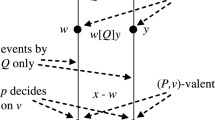Abstract
Distributed computing systems have traditionally been designed using either a purely asynchronous methodology, in which no use is made of time, or a purely synchronous one, in which all delays are bounded and clocks are assumed to be synchronized. We argue in favor of an intermediate approach, in which delay states would be systematically removed from an asynchronous system, resulting in a high probability of predictably good performance. Preliminary and very informal analysis suggests that this would yield systems with predictably high performance, and yet that are as likely to achieve this performance as would a real-time system based upon a traditional synchronous design. Such thinking leads to a paradox. On the one hand, we conclude that asynchronous systems may be able to offer real-time properties with high probability. On the other, it fosters concern that all properties of distributed systems might better be viewed as probabilistic.
The author was supported in part by ARPA and ONR under contract number N00014-92-J-1866.
Preview
Unable to display preview. Download preview PDF.
Similar content being viewed by others
References
Y. Amir, et. al. Transis: A communication subsystem for high availability. In Proceedings of the 22nd International Symposium on Fault-Tolerant Computing, pages 76–84, Boston MA (July 1992). IEEE.
K.P. Birman and R. Van Renesse, eds. Reliable Distributed Computing with the Isis Toolkit. IEEE Computer Society Press (1994).
F. Cristian, H. Aghili, R. Strong and D. Dolev. Atomic broadcast: From simple message diffusion to Byzantine agreement. Proceedings of the 15th International Symposium on Fault-Tolerant Computing, Ann Arbor, Michigan (June 1985). IEEE.
F. Cristian, H. Aghili, R. Strong. Approximate clock synchronization despite omission and performance faults and processor joins. Proceedings of the 16th International Symposium on Fault-Tolerant Computing, Vienna, Austria (July 1986). IEEE.
M.J. Fischer, N.A. Lynch and M.S. Patterson. Impossibility of distributed consensus with one faulty process. Journal of the ACM, 32: 2, 374–382 (April 1985).
L.E. Moser and MP.M. Melliar-Smith. Probablistic bounds on message delivery for the Totem single-ring protocol. Proceedings of the Real-Time Systems Symposium, San Juan Puerto Rico (Dec. 1994). IEEE.
Dalia Malki, Ken Birman, Aleta Ricciardi, Andre Schiper. Uniform actions in asynchronous distributed systems. Dept. of Computer Science, Cornell University. TR 94-1447 (Sept. 1994).
R. Van Renesse, et. al. Horus: A Flexible Group Communications System. Forthcoming, Dept. of Computer Science, Cornell University (March 1995).
T. K. Srikanth, S. Toueg. Optimal clock synchronization. Journal of the ACM, 34: 3, 626–645 (July 1987).
Author information
Authors and Affiliations
Editor information
Rights and permissions
Copyright information
© 1995 Springer-Verlag Berlin Heidelberg
About this paper
Cite this paper
Birman, K.P. (1995). Merits of a probabilistic approach to properties in process group systems. In: Birman, K.P., Mattern, F., Schiper, A. (eds) Theory and Practice in Distributed Systems. Lecture Notes in Computer Science, vol 938. Springer, Berlin, Heidelberg. https://doi.org/10.1007/3-540-60042-6_15
Download citation
DOI: https://doi.org/10.1007/3-540-60042-6_15
Published:
Publisher Name: Springer, Berlin, Heidelberg
Print ISBN: 978-3-540-60042-8
Online ISBN: 978-3-540-49409-6
eBook Packages: Springer Book Archive




